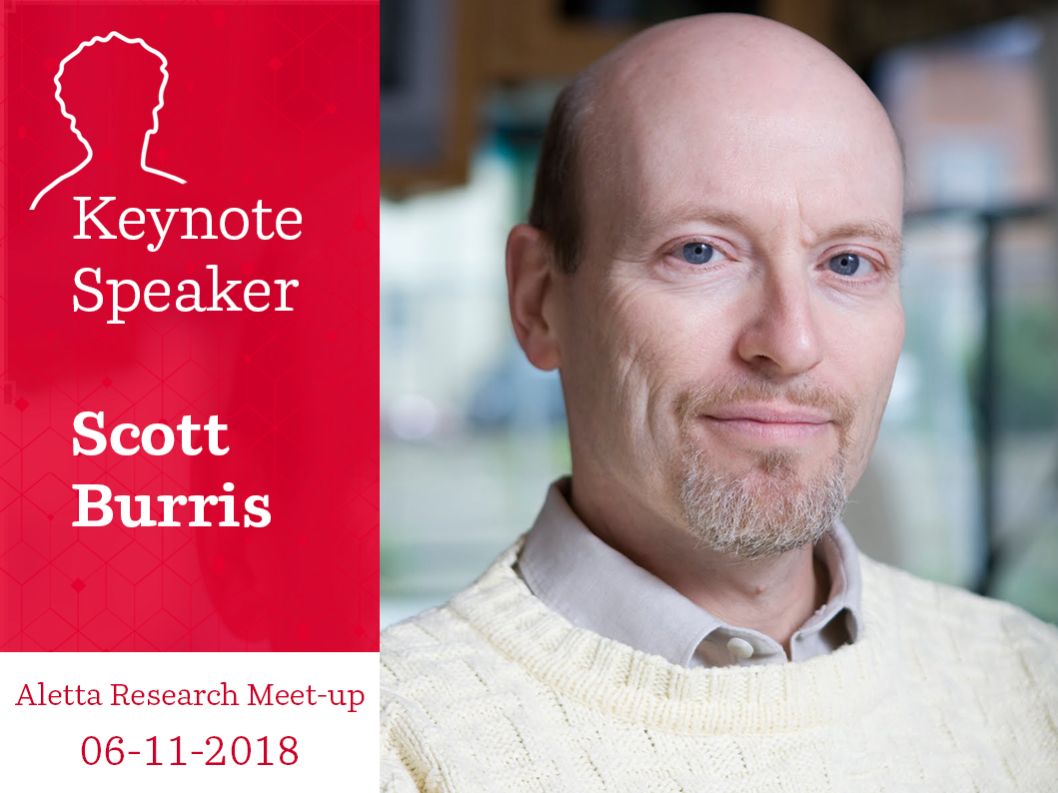Meet Scott Burris: Keynote Speaker at the third Aletta Research Meet-up

On 6 November our next edition of the Aletta Research Meet-up will take place. A meet-up that is organised for all researchers and professionals interested in public health. This time the meet-up will be dedicated to the topics ‘Health Inequality’ and ‘Life Course Perspectives on Public Health’. In this blog you can read more about the subject of Scott Burris’ keynote: ‘The New Public Health Law: The transdisciplinary approach.’
Scott Burris
Professor Burris is a professor of Law and Public Health at Temple University, where he directs the Center for Public Health law Research. His work focuses on how law influences public health and what interventions can make laws and law enforcement practices healthier in their effects.
Passion for public health law
Burris his passion began in the beginning of his legal career when HIV/AIDS was emerging as a major health and social crisis. The professor explains: “I edited the first book comprehensively covering the legal issues (AIDS and the Law: A Guide for the Public, 1987) and when my training was finished I started a state AIDS law program for the American Civil Liberties Union of Pennsylvania. I saw how law not only influenced individual well-being, by protecting people from discrimination and loss of privacy, but also how it shaped the level and distribution of the disease in the population. For example, laws prohibiting access to sterile syringes for drug users was probably the primary reason we had large epidemic of HIV in that population. Seeing that law was a pervasive force shaping health, I also came to see that it was misunderstood and neglected across most of the public health system, so it became my cause to change that.”
Criminal laws and law enforcement practices creating health risks
Over the past 30 years, Burris has been part of several important research developments: “In the late 1990s and early 2000s, my research on the criminalization of HIV and its impact on risk behaviour and health helped establish that punitive approaches to HIV control were ill-advised. From there, I was one of the researchers who showed that criminal laws and law enforcement practices were creating health risks for drug users and sex workers. In the past decade, my most important work has been conceptual and methodological: I have worked with others to establish the field of “legal epidemiology” (the scientific study of the impact of laws and legal practices on health) and to build tools and methods for this branch of research.”
And why is this so important? “As discussed above, law is an incredibly powerful force for health. Many of the great health improvements of the past 100 years (say, tobacco control, vaccination, road safety) have been achieved in large part through law. But law can also have the sort of large negative effects I mention above, so it is also very important to understand and address those effects. To put it simply, you would never take a drug that had not been tested, and you expect that the authorities are monitoring drugs in use for harmful side effects. But we typically enact laws that “treat” millions of people without ever finding out if they work, let alone whether they have side effects.”
The New Public Health Law
The ‘new public health law’ captures the idea that law in public health is not just for lawyers. Burris explains: “Most ‘legal’ functions in public health are actually carried out by non-lawyers: policy development, advocacy for new laws or changes in law, implementation, and evaluation are all crucial to effective use of law, and all require people with different kinds of training and experience. The idea of the new public health law is that PH law is a ‘transdisciplinary’ field where people from many professional and social backgrounds share methods, tools and knowledge to promote better health faster through law. I am hoping that, worldwide, this approach changes fundamentally how people in health systems are trained, and how they do their jobs.”
Secret of a long, happy life
According to Burris the secret in all things is moderation: “Tolerance and empathy make social life less stressful. Being Dutch and riding a bike everywhere is a plus, or whatever one’s native version of regular exercise might be. And, finally, social justice and equality, which create the best chance that we can all be healthy.”
Keynote
Professor Burris will describe the emergence of a new approach to public health law in the United States, and its implications for effective legal action for public health everywhere. The “transdisciplinary model of public health law” is characterized by the integration of methods and tools from law and the sciences of public health. The effort includes specification of “Five Essential Public Health Law Services,” elaboration of a field of “legal epidemiology,” and development of the practice of “policy surveillance.” These efforts are enabling the more credible and rapid development and diffusion of legal chances that promote and protect health
Check our event page for more information about the Research Meet-up.



